Applied Mathematics
Vol.3 No.12A(2012), Article ID:26547,3 pages DOI:10.4236/am.2012.312A277
Gnedenko-Raikov’s Theorem Fails for Exchangeable Sequences
1Department of Mathematical Sciences, University of New Brunswick, Saint John, Canada
2Department of Mathematical Sciences, Lakehead University, Thunder Bay, Canada
Email: *stoica@unb.ca
Received July 17, 2012; revised August 17, 2012; accepted August 25, 2012
Keywords: Exchangeable Sequences; Central Limit Theorem; Weak Law of Large Numbers
ABSTRACT
We study the connection between the central limit theorem and law of large numbers for exchangeable sequences, and provide a counterexample to the Gnedenko-Raikov theorem for such sequences.
1. Introduction
The celebrated Gnedenko-Raikov theorem states that sums of independent, infinitesimal random variables are asymptotically normal if and only if the sum of squares, centered at truncated means, is relatively stable. The following variant for i.i.d. random variables has been recently proved in [1]:
Theorem 1. Let 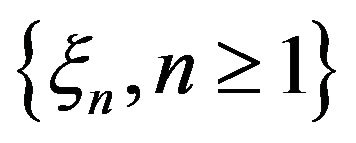 be i.i.d. random variables with mean zero, and
be i.i.d. random variables with mean zero, and  a sequence of positive reals increasing to
a sequence of positive reals increasing to![]() . Then
. Then

if and only if

A classical extension of independence is exchangeability, and in this context we shall prove that the Gnedenko-Raikov theorem fails. First, let us recall the basic facts. A sequence of random variables 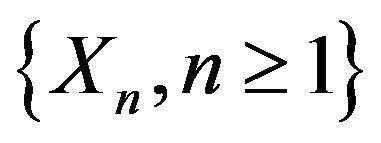 on the probability space
on the probability space 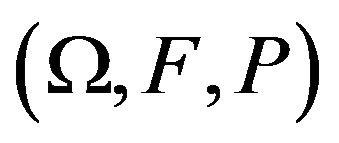 is said to be exchangeable if for each n,
is said to be exchangeable if for each n,

for any permutation π of 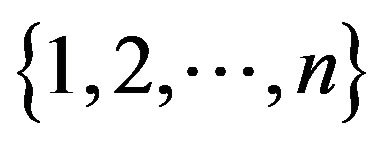 and any
and any . Two trivial examples are i.i.d. random variables and totally determined random variables
. Two trivial examples are i.i.d. random variables and totally determined random variables  . Two nontrivial but simple examples are
. Two nontrivial but simple examples are
 and
and  where the rn’s are i.i.d. and independent of
where the rn’s are i.i.d. and independent of  or
or![]() , respectively.
, respectively.
By de Finetti’s theorem, an infinite sequence of exchangeable random variables is conditionally i.i.d. given either the tail ![]() -field of
-field of 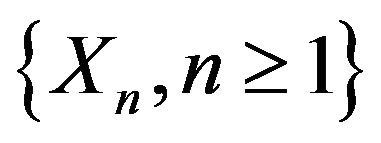 or the
or the ![]() -field G of permutable events. Furthermore, there exists a regular conditional distribution
-field G of permutable events. Furthermore, there exists a regular conditional distribution  for
for 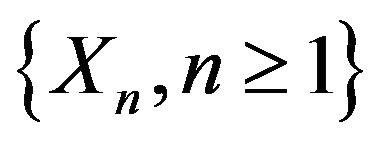 given G such that for each
given G such that for each  the coordinate random variables
the coordinate random variables , called mixands, of the probability space
, called mixands, of the probability space 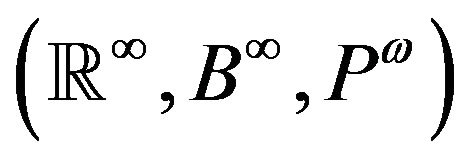 are i.i.d. Namely, for each natural number n, any Borel function
are i.i.d. Namely, for each natural number n, any Borel function , and any Borel set
, and any Borel set  on
on ,
,
 (1)
(1)
The following central limit theorem for exchangeable sequences has been proved in [2]:
Theorem 2. Let  be a sequence of exchangeable random variables. Then there exist constants
be a sequence of exchangeable random variables. Then there exist constants  with
with , such that
, such that
 in distribution if and only if there exists a positive sequence
in distribution if and only if there exists a positive sequence 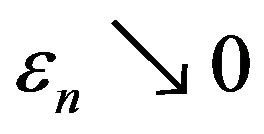 such that
such that

and either  is slowly varying with
is slowly varying with

or 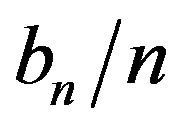 is slowly varying with
is slowly varying with


where

and

In the above theorem, the case where  is slowly varying characterizes the situation when the classical central limit theorem holds for the mixands, whereas the case where
is slowly varying characterizes the situation when the classical central limit theorem holds for the mixands, whereas the case where 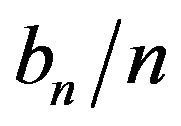 is slowly varying characterizes the situation when the law of large numbers holds for the mixands and those limits have a standard normal distribution. Recently, we “cleaned” the latest statement and proved in [3] the following variant of the law of large numbers for exchangeable sequences:
is slowly varying characterizes the situation when the law of large numbers holds for the mixands and those limits have a standard normal distribution. Recently, we “cleaned” the latest statement and proved in [3] the following variant of the law of large numbers for exchangeable sequences:
Theorem 3. Let  be a sequence of exchangeable random variables and
be a sequence of exchangeable random variables and 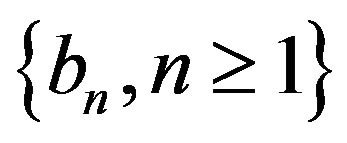 a sequence of positive reals increasing to
a sequence of positive reals increasing to![]() , that satisfy the following conditions:
, that satisfy the following conditions:

and

where

Then

where

Unless the sequence 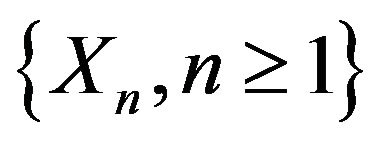 is i.i.d., the converse in the above theorem is not true; more is needed, see [4].
is i.i.d., the converse in the above theorem is not true; more is needed, see [4].
We are now ready to provide the counterexample mentioned in the introduction. It will rely on both Theorems 2 and 3, and some specific constants . More precisely, we have:
. More precisely, we have:
Theorem 4. Let 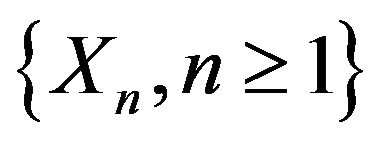 be a sequence of exchangeable random variables and
be a sequence of exchangeable random variables and  a sequence of norming constants that satisfy the following condition:
a sequence of norming constants that satisfy the following condition:
 (2)
(2)
where 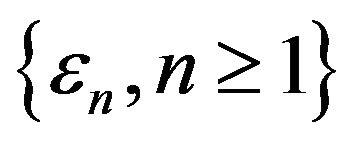 is the sequence appearing in Theorem 2.
is the sequence appearing in Theorem 2.
1) Assume that the sequence  is nondecreasing for some
is nondecreasing for some  and satisfies
and satisfies

for all  and some constant
and some constant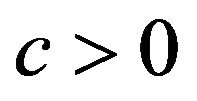 . Then
. Then

2) If  and
and  are slowly varying for some
are slowly varying for some , then
, then

and the Gnedenko-Raikov theorem fails in this case.
Proof of Theorem 4. 1) Under the assumptions on the sequence  and according to [5], p. 680, we have that
and according to [5], p. 680, we have that

Also, cf. Section 2 in [5], we have that  and
and . These facts imply that
. These facts imply that
 (3)
(3)
Taking into account the following identity (with the notations in Theorem 2):

which gives

from formula (3) it follows that
 (4)
(4)
Now let  be given. By formula (1) and the triangle inequality we have
be given. By formula (1) and the triangle inequality we have
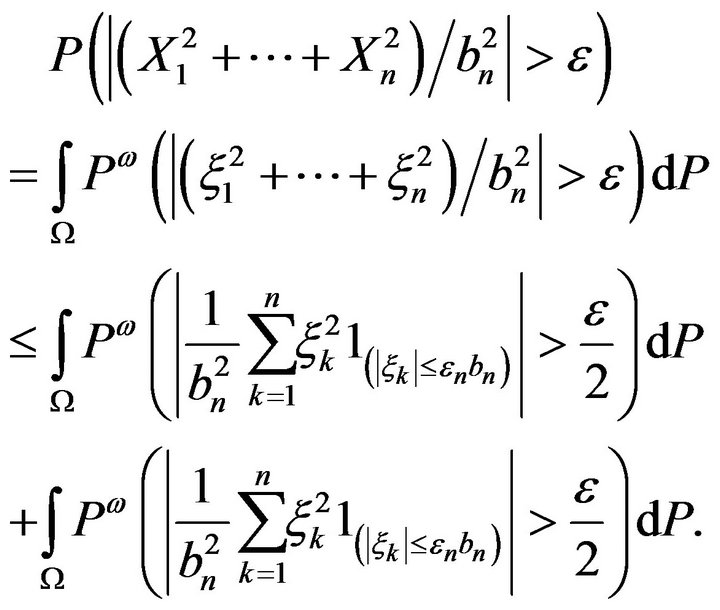 (5)
(5)
Using (2), we estimate the first term in the right hand side of (5) as follows:
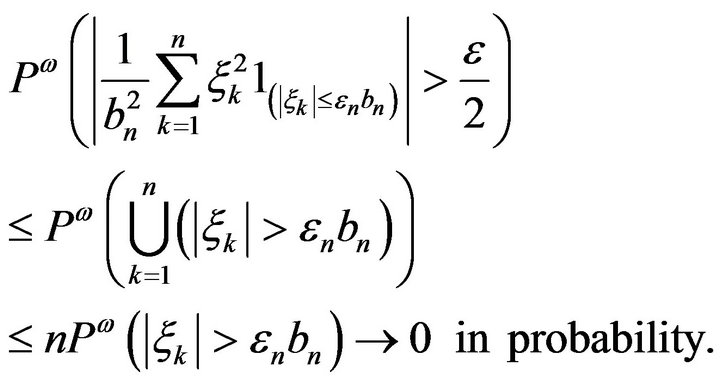 (6)
(6)
We then break down the second term in the right hand side of (5) as follows:
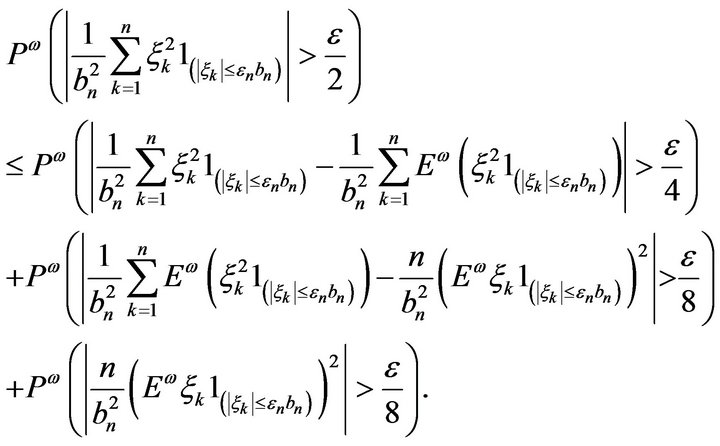
(7)
Using (4), we have
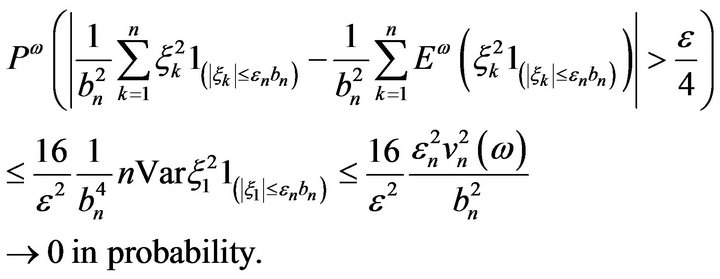
(8)
Also, cf. (4),

(9)
and, again cf. (4),
 (10)
(10)
From (5)-(10) we deduce that
 in probability.
in probability.
Now, let us prove 2). If 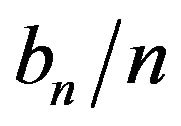 is slowly varying, and using (4), Theorems 2 and 3 imply that
is slowly varying, and using (4), Theorems 2 and 3 imply that  in distribution. If, in addition,
in distribution. If, in addition, 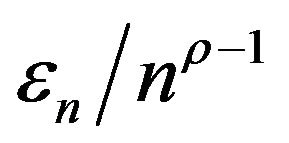 is slowly varying for some
is slowly varying for some , then the hypotheses on the sequence
, then the hypotheses on the sequence  in part 1) of Theorem 4 are satisfied cf. section 2 in [5], hence the Gnedenko-Raikov theorem fails in this case. □
in part 1) of Theorem 4 are satisfied cf. section 2 in [5], hence the Gnedenko-Raikov theorem fails in this case. □
Remark. It is worth noting that the Gnedenko-Raikov theorem is valid in the case where 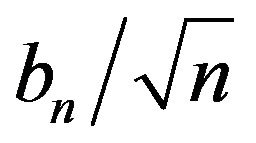 is slowly varying in Theorem 2, as well as in both self-normalized central limit theorem [6] and self-normalized law of large numbers [7] for exchangeable sequences. This is why the counterexample in Theorem 4 above was rather hard to get.
is slowly varying in Theorem 2, as well as in both self-normalized central limit theorem [6] and self-normalized law of large numbers [7] for exchangeable sequences. This is why the counterexample in Theorem 4 above was rather hard to get.
The research of George Stoica and Deli Li was partially supported by grants from the Natural Sciences and Engineering Research Council of Canada.
REFERENCES
- A. Gut, “Gnedenko-Raikov’s Theorem, Central Limit Theory, and the Weak Law of Large Numbers,” Statistics and Probability Letters, Vol. 76, No. 17, 2006, pp. 1935- 1939. doi:10.1016/j.spl.2006.04.042
- M. Klass and H. Teicher, “The Central Limit Theorem for Exchangeable Random Variables without Moments,” Annals of Probability, Vol. 15, No. 1, 1987, pp. 138-153. doi:10.1214/aop/1176992260
- G. Stoica and D. Li, “On the Kolmogorov-Feller Law for Exchangeable Random Variables,” Statistics and Probability Letters, Vol. 80, No. 9-10, 2012, pp. 899-902. doi:10.1016/j.spl.2010.01.025
- G. Stoica, “An Extension of the Weak Law of Large Numbers for Exchangeable Sequences,” Acta Applicandae Mathematicae, Vol. 109, No. 3, 2010, pp. 759-763. doi:10.1007/s10440-008-9344-x
- M. V. Kruglov, “A Generalization of the Weak Law of Large Numbers,” Stochastic Analysis and Applications, Vol. 29, No. 4, 2011, pp. 674-683. doi:10.1080/07362994.2011.581099
- X. Jiang and M. G. Hahn, “Empirical Central Limit Theorems for Exchangeable Random Variables,” Statistics and Probability Letters, Vol. 59, No. 1, 2002, pp. 75-81. doi:10.1016/S0167-7152(02)00204-3
- G. Stoica, “A Self-Normalized Weak Law of Large Numbers for Exchangeable Sequences,” Advances and Applications in Statistics, Vol. 25, No. 2, 2011, pp. 103-108.
NOTES
*Corresponding author.

